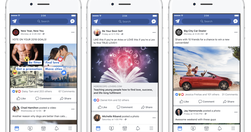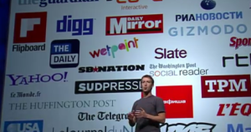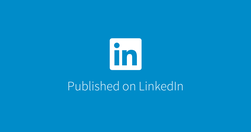
"The New York Times is preparing to plant a taproot right inside the highly walled garden that is Facebook." - Memo To Publishers: Watch Where You Put That Taproot… — Medium
"the idea of distributed content argues that publishers should be more comfortable putting their content on platforms they don’t control. But Facebook isn’t just another platform. It’s dominant in a way no other platform is... the sort of decision that one might look back on in a few years as the moment you got swindled" - Facebook wants to be t…

"reach is an easy-to-see vanity metric and not what you should be focusing on.... Facebook Insights provides some handy numbers, but the most useful ones are somewhat hidden." - 6 tips on Facebook analytics and going beyond...
Personally I've been creeped out by all this since reading the Filter Bubble, but apparently I'll be feeling less lonely about it next year. Great image here: "Think of a world in which your phone constantly checked in with the central phone company to decide which of your relatives it should allow you to call, and to jumble their sentences aroun…

"we’re collecting all the Facebook algorithm factors, updates, and changes that we can find and placing them here in this post for easy reference." - Inside the Facebook News Feed: A List of Algorithm Factors

"Starting in January, in another blow to organic reach, users will see fewer posts that are solely focused on sales or sweepstakes or reuse ad copy.... hundreds of thousands of people said they wanted to see more stories from friends and Pages they care about, and less promotional content.” Well, duh. Who actually WANTS to see promo junk? Be use…

"Facebook say that the more time users spend at its site, the more likely there will be a robust exchange of diverse viewpoints and ideas shared online. Others fear that users will create their own echo chambers, and filter out coverage they do not agree with. ... [that] “is when you get conspiracy theories.” - How Facebook Is Changing the Way It…

"publishers [could] simply send pages to Facebook ... hosted by its servers ... with ads that Facebook sells. The revenue would be shared. That kind of wholesale transfer of content sends a cold, dark chill down the collective spine of publishers... Media companies would essentially be serfs in a kingdom that Facebook owns." - Facebook Offers Li…

"The news media sector has become heavily dependent on traffic from Facebook and Google. A reliance now dangerously close to addiction. Maybe it’s time to refocus on direct access... Which company in the world wouldn’t be seen as fragile when depending so much on a small set of uncontrollable distributors? for a news, value-added type media, the…

After the standard survey of Facebook's impact on news & democracy, an interesting analysis of the way Facebook's: "trending topics has had a deeply pernicious effect on the way news is produced... encourages publications to look for what's trending and pump out something on that subject as quickly as possible... lots of quickly aggregated p…

"With several overlapping features, Facebook's Pages, groups and profiles leave many users confused... each has its own purpose and works for different types of content." - What's Really the Difference Between Facebook Pages, Groups and Profiles?

"trying to game the algorithm doesn’t work, and that the only real secret to getting lots of interaction from Facebook for your content is to create and post great content (this was always Google’s argument as well). But what is great content? ... is it clickbait that drives people to share, or is it in-depth analysis of important topics?... by g…

"The notion that the world outside its homepage remains anonymous is increasingly untrue. Millions of internet users voluntarily give Facebook, Google, and others access to their movements across the web and on mobile when they use “social log in,” or the ability to sign in to a website using credentials from the big identity providers.... as mob…
One thing I'm not hearing is whether website owners will be able to use Atlas data to customise their user experience. "Atlas will allow marketers to tap its detailed knowledge of its users to direct ads to those people on thousands of other websites and mobile apps.... Facebook has deep, deep data on its users. You can slice and dice markets, l…

Just substitute 'governments' for 'businesses' and 'brands', 'citizens' for 'customers', and 'policy' for 'product' in this excellent HBR post: "Businesses need to take Ello and its manifesto as a wake-up call to rethink the way they use social networks to reach customers... That means stepping back from the relentless quest for followers, click…

"Facebook executives met with a group of drag queens from San Francisco to discuss the social network’s infamous “real names” policy... Facebook apparently had no intention of negotiating because the policy was crafted for the sale of targeted ads not for the safety of human beings with complex identities.... Facebook appears like a school bully…

Mashable hedges its bets: ""We believe a social network can be a tool for empowerment... Not a tool to deceive, coerce, and manipulate — but a place to connect, create, and celebrate life. You are not a product."" - What's Up With Ello, the Anti-Facebook Social Network?
"But for those searching for what's next, Ello is not it. There have been a few versions of this virtuous social network before—from Diaspora (forgotten), App.net (oof), and even Path (oy) ... [Diaspora] was intended less as an imitation of Facebook than as an escape route from it... New York magazine wrote almost four years ago to the day."

"This is a Big Deal for a lot of people right now, because the software companies that support our social lives have become so evil and pervasive and controlling in recent years." - What Does Ethical Social Networking Software Look Like? — The Message — Medium
Not all shortform content is clickbait - Chartbeat thinks Circa shouldn't worry. "The depressing truth of the Internet is that short-form content hangs out on the same end of the distribution curve of the Internet as long form when it comes to attention. ... the majority of pageviews get fewer than 15 seconds of engagement. Facebook is looking …

"It seems like Facebook’s favorite pastime is messing with its algorithm, to the terror of brands, media, and consumers everywhere. ... Today’s change is all about timing. The company wants to make the posts that appear in your feed more relevant based on the context of “when.” That way, you’re not seeing your friends statuses about the Emmys day…

"Just because Twitter wants to be more like Facebook doesn't mean Facebook doesn't want to be more like Twitter. " - Facebook Takes Another Tip From Twitter And Pushes Trendy Topics - ReadWrite
"It doesn’t refer to Ferguson, Ice Bucket Challenge videos or a solemn responsibility to bring you news that really matters, but Facebook does seem to be addressing concerns about the service’s ability to surface timely, important news stories." - Facebook: More timely News Feed on the way | Poynter.
As I mentioned in my previous post, the past couple of years have seen a lot of innovation in online content strategy, coupled with growing disenchantment with "Big Internet".

On #icebucketchallenge, obviously. - I Scream, You Scream, We all Scream ‘Look at Me’ | LinkedIn

"The process of placing an ad on News Feed is a complicated dance. Facebook has to decide not only which ad to show to its users, but when to show it to them... any given user has around 1,500 stories they could see each day. ... a rather complex algorithm that weights how engaging each post is ... and a wide range of other signals ... For examp…

"Facebook seems to be trying to get more transparent about how the algorithms ... function, with a statement on Monday about cracking down on “clickbait.” ... But despite the attempts at openness, the bottom line remains the same: Facebook is a black box. No one really has any clue why the site chooses to show or hide certain content... what com…
"Since it launched in March 2012, I F*cking Love Science has attracted more than 17.9 million Facebook followers—more than Popular Science (2.7 million), Discover (2.7 million), Scientific American (1.9 million), and The New York Times (8 million) combined. ... Her empire has since expanded to include a website, IFLscience.com, which has a staff a…

While possibly a bit naive regarding Facebook's motivation for crucifying organic reach, some good points here: "- Talking doesn’t equal connecting: It seems that many brands take their audience for granted. Liking a page doesn’t always imply interest. ... - Paid reach won’t substitute for great storytelling: While paid reach might get more visib…

A new angle on the filter bubble: Facebook's ""Report Abuse" button, which is used to flag content that's hostile or inappropriate ... can also be used as a tool for stifling dissent... If you swarm a page or a person with enough abuse reports, you can kick them off Facebook. Pro-government forces in Vietnam have learned how to do it, and they’re…